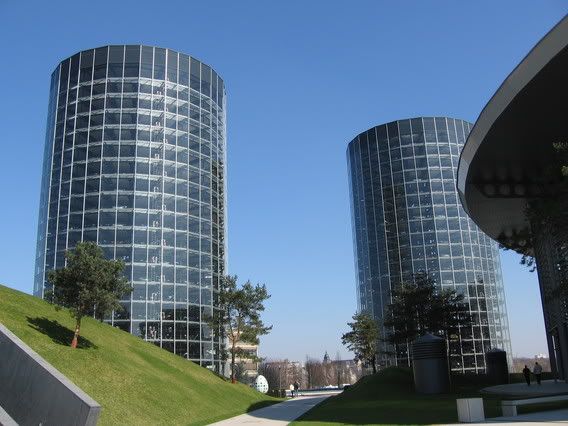
Parking issues and discussion (City of Victoria & Greater Victoria)
#21

Posted 23 October 2006 - 11:39 AM
#22

Posted 23 October 2006 - 11:47 AM
Seriously, folks, you'd need 3,700 playing cards wrapped around bicycle wheels to create 1/50th of the noise those exhausts produce. Perhaps cyclists don't use that excuse because they have bells?
Ding ding.
Know it all.
Citified.ca is Victoria's most comprehensive research resource for new-build homes and commercial spaces.
#23

Posted 03 November 2006 - 01:32 AM
#24

Posted 03 November 2006 - 08:11 AM
Call me when you're on the new part of the island highway, driving the speed limit of 110 on your bicycle and a semi changes into your lane. Then you're free to call BS.I call BS on their "saftey with loud exchausts" campaign.
#25

Posted 03 November 2006 - 09:16 AM
Call me when you're on the new part of the island highway, driving the speed limit of 110 on your bicycle and a semi changes into your lane. Then you're free to call BS.I call BS on their "saftey with loud exchausts" campaign.
A bicycle can't drive at 110!
So, what you're saying, is the loud exhausts save bikers from semi's changing lanes? That's the silliest thing I've ever heard! Ever been in a semi?? You can barely hear anything around you and you rely on mirrors and the lights of other vehicles. If a semi driver turns onto a bike while changing lanes then the biker wasn't "seen." It's got nothing to do with not being "heard," believe me.
Furthermore, bikers being the smallest presence on the road shouldn't ride in blind spots of 50-ton machines. That's asking for trouble.
Still smells of BS to me
http://www.noiseoff.org/pipes/
http://www.ama-cycle...tions/noise.asp
Know it all.
Citified.ca is Victoria's most comprehensive research resource for new-build homes and commercial spaces.
#26

Posted 25 November 2006 - 10:46 AM
Sounds very cool on one level, but could it work here? I mean, how would they change the light bulbs...?! 8)When I saw the editorial "City parkades need a bolder vision" (Nov. 21) I hoped that at last someone would mention the automated or robotic type of facility. I was disappointed.
Surely others have heard of them? A Google search will turn up at least half a dozen variations, some of which should at least be considered by the city. Imagine a tower with nothing but an entrance and an exit -- no ramps, stairs or elevators for people -- built on an existing city-owned parking lot. The ground floor could be leased as retail while the upper or below-ground floors hold the parked cars, which are placed by an automated device that can retrieve a car in less than two minutes. Try beating that at rush hour in existing smelly parkades. No access for people means no camping out, no need for ventilation and lighting and no security concerns.
The cost is greater than the old-fashioned parkade but the parking density is much higher and some costs are recoverable by renting out retail space.
John Bartlett,
Cobble Hill.
#27

Posted 25 November 2006 - 10:51 AM
#28

Posted 25 November 2006 - 10:56 AM
From the Boston Globe, an article about the benefits:
[url=http://www.boston.com/business/globe/articles/2006/01/30/robodude_wheres_my_car/:aa96c]Robodude, where's my car?[/url:aa96c], leading with:
With the cost of land soaring, and construction costs for a single parking space in an underground garage running between $50,000 and $70,000 in the Boston area, automated parking systems -- common in congested areas of Europe and Asia -- have begun to immigrate to the United States.
From a builder/ manufacturer: [url=http://www.aptparking.com/pages/whatisautomatedparking.htm:aa96c]A.P.T. Parking Technologies[/url:aa96c]
Another Boston-area site: [url=http://www.urbanplanet.org/forums/index.php?showtopic=9245:aa96c]Parking for the 21st century; Not only do they look different, but some of the new garages are going robotic[/url:aa96c]
[url=http://www.cooltownstudios.com/mt/archives/000515.html:aa96c]Cool town studios[/url:aa96c]
[url=http://www.robopark.com/articles/urbanland.html:aa96c]Robotic Parking[/url:aa96c]
[url=http://www.wowflutter.com/2003/09/26/106461374973315541/:aa96c]Space Age Automated Parking Garages[/url:aa96c]
#29

Posted 25 November 2006 - 10:58 AM
I think it would also be a user-interface thing, tricky to get people to accomodate themselves to if not done really really well.
#30

Posted 25 November 2006 - 11:38 AM
I doubt land prices aren't high enough to justify the savings one would see on a reduction of the footprint compared to conventional garages.
#31

Posted 25 November 2006 - 01:08 PM

#32

Posted 25 November 2006 - 09:22 PM
#33

Posted 25 November 2006 - 11:08 PM
I believe you are referring to [url=http://www.jamesonfoster.com/:13b7f]Jameson House[/url:13b7f] by Sir Norman Foster and Partners (Warning: their bloated Flash website takes forever to load and features an annoying 70's **rno soundtrack). The information on the automated parking garage can be found by clicking on Amenities > Parking.I think that there's an automated parking garage being built in one of the new Vancouver condo's, but I'm pretty sure it's a first, I'll have to look into that.
#34

Posted 26 November 2006 - 12:10 AM
The Transparent Factory (Gläserne Manufaktur) is the Volkswagen plant in Dresden, Germany. It features glass towers for storing completed cars before shipping. They are not in high density areas and because they are made from standardised components, they're not as expensive to build as one-of-a-kind concrete structures.I doubt land prices are high enough to justify the savings one would see on a reduction of the footprint compared to conventional garages.


#35

Posted 26 November 2006 - 12:44 AM
Some U.S. condos are being built [url=http://query.nytimes.com/gst/fullpage.html?res=9F02E7DC1F3FF931A25752C1A9609C8B63:80c77]without parking[/url:80c77].
-City of Victoria website, 2009
#36

Posted 26 November 2006 - 09:51 AM
Anyone know why CoV enforces this?
#37

Posted 26 November 2006 - 10:30 AM
The Transparent Factory (Gläserne Manufaktur) is the Volkswagen plant in Dresden, Germany. It features glass towers for storing completed cars before shipping. They are not in high density areas and because they are made from standardised components, they're not as expensive to build as one-of-a-kind concrete structures.I doubt land prices are high enough to justify the savings one would see on a reduction of the footprint compared to conventional garages.
Still not convinced.
This is a facility designed to store a LOT of vehicles. Although not high density, they still might have been faced with a crunch on space, based on whatever size the grounds are for this factory.
I'd like to see some real numbers comparing the cost of conventional versus the modern ones.
Standardized components may make it cheaper, but cheaper than conventional ones? What's the cost difference? I looked at some B Havin's links and couldn't find any prices. Where's the beef?
#38

Posted 26 November 2006 - 11:32 AM
...Anyway: the article is from 2003, so obviously the numbers aren't going to be that meaningful anymore, and the article notes that costs do vary from context to context. (Vancouver definitely sounds like a candidate, though...) (Emphases added by me)
I'll copy & paste some major chunks from the article, just in case it isn't accessible w/out an account:
Hoboken's Garden Street Garage is completely computerized, with two identical elevator systems that are able to move simultaneously in both vertical and horizontal directions and communicate with each other by wireless transmitters. The garage's computer figures out which of the hundreds of spaces in the building a vehicle should occupy, and then delivers it there untouched by human hands. (...)
In its first year of operation, according to the computer records, the average wait to retrieve a car was 2.5 minutes.
THE key breakthrough with his type of design, according to Mr. Haag, is that the mechanized system is "truly redundant." With older automated designs, said Mr. Haag, all three movements a car elevator can make — in and out, up and down, side to side — are powered by one central unit. If any single part fails, the garage becomes inoperable.
Mr. Haag's patented design has dual systems, so that its two elevators can move separately and independently, and the three types of movements they make are each powered by separate motors. Furthermore, each individual motor has a backup. There are twin motors powering the rollers under the pallets, for example, each working at less than half capacity and programmed to take over if the other should fail.
Besides increasing reliability, notes Dale F. Denda of PMRC, a national parking market research company, the fully automatic garage means "throughput" is enhanced — parking lingo for shortening the time it takes to store cars and retrieve them.
The one other fully automatic garage in the United States is set beneath the Summit Grand Parc, an apartment building two blocks from the White House in Washington that incorporates both a new apartment tower and historic structure that was once home to the United Mineworkers. Designed by the Spacesaver Parking Company, a division of the Mid-American Elevator Company, and using equipment manufactured by a German concern, Wohr, the garage parks just 74 cars, and has only one automated elevator system.
"But without the automated system," said Michael A. Underwood, a senior vice president of the project's developer, Summit Properties, "we wouldn't have had parking at all. For the kind of luxury apartments we provide, we had to have parking — but this was a narrow lot between existing buildings, and with a conventional garage, we found ourselves hamstrung by site constraints. Automation provided an option."
Urban land use specialists say that this sort of situation will continue to occur in congested American cities, and that automated parking could become a widely used option. Tomorrow, in fact, a seminar on automated parking is scheduled at the Urban Land Institute, a Washington research institute, using the Summit Grand Parc as a case study. (...)
Monthly rates for parkers would be competitive with those at a conventional garage, said Mr. Haag, "or else the market wouldn't exist." In Hoboken, a standard municipal fee of $200 per month applies, at the automated garage and all others. In Washington, Summit Grand Parc residents pay $225 monthly, and for S.U.V. size spots, $250.
Until very recently, the American way has been to indulge a cultural passion for driving, even in a parking structure, observed Shannon Sanders McDonald, an architect and scholar who is writing two books on the history of parking garages and land use — one of them with Mr. Haag.
"People love their cars in this country," Ms. McDonald said. "and the car-loving culture is the main reason for the garage typology."
In Europe and Asia, the development history, traffic patterns, and parking "culture" are different, she said, and cities simply are not built to accommodate the hulking presence of a typical ramped structure. There are roughly 5,000 automated garages on those two continents — including dozens that are fully computerized and robotically operated like the ones in Hoboken and Washington.
Ramped garages are actually very unpopular with many Americans — "ignored at best," Ms. McDonald said, "hated by many." Why would people loathe a parking garage? Let her count the ways: "They are perceived to be ugly, grimy, scary places where muggers are waiting to snatch purses and wallets, you will probably get your car paint scratched or your fender bent, and you are more than likely to get trapped in a long line of cars spewing exhaust when you're trying to get to the exit." (Well, that sounds familiar in terms of perception of our d/t garages...!)
Ms. McDonald, an architect who currently serves as an adjunct professor of architecture at North Dakota State University in Fargo, says garages have been made a "scapegoat for urban ills." Yet she and others in the emergent field of scholarly research on parking — along with entrepreneurs like Mr. Haag — make a case that automatic garages actually help alleviate some of what ails modern cities, by eliminating the dirty-and-scary factor, and by maximizing land use. (again, though, one wonders whether people wouldn't be scared by the "robotic" aspect itself...)
"The main advantage of automated garages," said Mr. Denda, who is the research director for PMRC, which is based in McLean, Va., "is that they can be built on sites that are too small or irregular for the construction of conventional garages."
Of course, the cost of construction and operation also figure in heavily to a developer's decision to build an automated garage.
IN Baltimore, Ashbourne Properties is considering Mr. Haag's Robotic Parking system for a proposed three-building apartment complex that has street access only 60 feet wide. "It is the only way we could provide on-site parking — and we are happy to have the option," said Ashbourne's president, Crispin Etherington.
"The price we have been quoted is $22,000 per space, when conventional parking costs about $15,000 per space. We are studying the economics of our project, and the Baltimore market before deciding which way to go." (In other words, if scarcity of available land isn't driving the price way up, it's quicker, dirtier, easier to build traditional garages ...for the short term, anyway.)
Another developer, David Barry of the Applied Companies in Jersey City, said his company recently decided against automated parking for a 12-story apartment structure going up in that city based on cost, and also the general reluctance of lenders to underwrite "something so new, and untested."
Mr. Haag also noted that being on the cutting edge can cause problems for conservative lenders. In his view, the ongoing tests of the structural strength and reliability of the Hoboken garage being done to satisfy the construction bonding company are "really overdoing it."
But as developers in many metropolitan areas find themselves scrapping over sites they would have considered unbuildable even a year or two ago, Mr. Denda said, automatic parking garage proposals are increasingly coming into play — and familiarity with the issues they raise will rise.
The four-level automatic garage in Washington, beneath the Summit Grand Parc, occupies a space measuring 60 by 106 feet — smaller than many suburban yards. It is 32 feet floor-to-ceiling — shorter than many power poles. (picture it... seems weird, eh?)
The Hoboken garage is situated in the middle of a block on a narrow street with metered spaces on both sides and is built on land that required considerable environmental cleanup.
Mr. Haag said that if a ramped garage could even have been built on the Hoboken site — which is questionable in his view — it would have provided only 95 spaces, compared with 324, and construction costs would have run close to $30,000 per space, compared with $20,000.
Precisely what the Hoboken garage cost, and how long it took to build, remain touchy issues in the city — with the mayor having recently abolished the parking authority after an investigation into how it handled the project, and Mr. Haag's Florida-based company, Robotic Parking Inc., and Belcor — the company that acted as general contractor — still locked in legal battle over which one was responsible for construction issues that caused delays. (Ah, politics, corruption, politics... One of the other articles -- Boston Globe, I think -- pointed out how it was one of Menino's friends who became contractor; Menino was mayor for a long time and was associated w/ all sorts of "you scratch my back I'll scratch your back" back(room) deals in Beantown...)
But Mr. Denda from the parking research company said none of that was particularly surprising. "That's the construction industry," he shrugged, "and in Hoboken, the municipality was involved, which only adds to the complications."
Seymour Gage, a veteran parking garage engineer from Manhattan, said he finds it difficult to believe one of the new fully automated garages will ever be built in New York.
Mr. Gage, 83, designed two automated garages in the 1950's that are still working today — as is he. The Showbiz Parking structure in the Manhattan theater district, off Eighth Avenue, between 45th and 46th Streets, was built in 1957, Mr. Gage said, using an elevator-on-wheels system devised by an Iowa inventor, Virgil Bowser, and Mr. Gage's engineering know-how. Like other mechanized garages of the era, it requires a staff — 8 to 10 people during peak hours — with valets stationed on each floor.
The new robotic computerized garages are "a totally different animal" from that one, Mr. Gage said. He is currently working as a consultant on construction of a fully automatic garage in Moscow, "which is becoming a hotbed of parking," he said, with hundreds of buildings going up, all with automatic parking structures beneath.
"Other companies are building in Beijing," Mr. Gage said, "and in Europe, right now a company called Klaus is putting up about 30 — very similar to the one in Hoboken."
"We Americans," he added, "are way behind on this, absolutely."
The additional cost of constructing an automated garage is one of the reasons for that, Mr. Gage said. "There is no question that the fully automatic garage is more expensive to build — maybe 50 to 75 percent more for a small one, 60 spaces or less," he said.
On the other hand, Mr. Gage said he was recently asked to consult on a proposal for building a large underground automated garage being contemplated in Brooklyn. In that case, he said, a robotic garage would be cheaper — by 20 percent.
"The main reason is it would be underground," he said. "That is more costly in general. But below ground, automated parking beats self-parking, because of savings on construction. You don't have to go as deep, or as horizontally."
AN industry group formed two years ago in Los Angeles — the Automated and Mechanical Parking Association — said the $20,000-per-space cost of an automated garage is a "disadvantage" planners have to consider. On the other hand, Mr. Haag insists that if the cost of land is figured in, an automated garage for 60 cars or more is always less expensive to build than one with the same capacity with ramps.
"Also, when comparing costs, many times it is forgotten," he said, "that our price includes a closed facade, a sprinkler system and a valet parking service." Automatic garages do not require a ventilation system, he pointed out, since the car engine is never running while the car is inside, and no exhaust fumes are generated. No pedestrian elevators, fire doors or emergency staircases are needed either.
An automated system uses more electrical power, he pointed out — but is much less labor-intensive. In Hoboken, there are just two young men running the show — Mr. Haag's son, Constantin, and Filipe Sousa, who oversees the computer system, watching blinking lights on his screen track the movement of cars through the garage, and receiving messages when any motor reaches one million revolutions and needs a maintenance check.
"It's really the garage doing all the work," Mr. Sousa said with a laugh. "We're just along for the ride."
#39

Posted 26 November 2006 - 11:48 AM
Thanks for the article. Interesting stuff.
#40

Posted 04 April 2007 - 07:02 PM
As someone that lives in a neighborhood adjacent to a central business district, I have personally experienced the impact of these types of inequities in parking. Many commuters are willing to park in neighborhood districts and walk to the remainder of the distance to obtain free parking. I believe this behavior is repeated in numerous neighborhoods near near commericial districts (drivers parking on neighborhood streets for free parking).
There really is a real psychology to parking. In fact, I'm not quite sure how I so often rationalize foregoing the minimal $5 ramp parking fee when I am ultimately risking the $40 parking ticket. I guess noone really likes to pay to park.
The NY Times article [url=http://www.nytimes.com/2007/03/29/opinion/29shoup.html?ex=1332820800&en=cdab73e4e6c4a982&ei=5090&partner=rssuserland&emc=rss:04602]notes[/url:04602]:
MOST people view traffic with a mixture of rage and resignation: rage because congestion wastes valuable time, resignation because, well, what can anyone do about it? People have places to go, after all; congestion seems inevitable.
But a surprising amount of traffic isn’t caused by people who are on their way somewhere. Rather, it is caused by those who have already arrived. Streets are clogged, in part, by drivers searching for a place to park.
Several studies have found that cruising for curb parking generates about 30 percent of the traffic in central business districts. (...) snip
(...) ...we found the average cruising time was 3.3 minutes, and the average cruising distance half a mile (about 2.5 times around the block). This may not sound like much, but with 470 parking meters in the district, and a turnover rate for curb parking of 17 cars per space per day, 8,000 cars park at the curb each weekday. Even a small amount of cruising time for each car adds up to a lot of traffic.
Over the course of a year, the search for curb parking in this 15-block district created about 950,000 excess vehicle miles of travel — equivalent to 38 trips around the earth, or four trips to the moon. And here’s another inconvenient truth about underpriced curb parking: cruising those 950,000 miles wastes 47,000 gallons of gas and produces 730 tons of the greenhouse gas carbon dioxide. (...) snip
What causes this astonishing waste? As is often the case, the prices are wrong. A national study of downtown parking found that the average price of curb parking is only 20 percent that of parking in a garage, giving drivers a strong incentive to cruise. As George Costanza once said on “Seinfeld”: “My father never paid for parking, my mother, my brother, nobody. ... It’s like going to a prostitute. Why should I pay when, if I apply myself, maybe I could get it for free?”
Note: this is one area where the City of Victoria is ahead: its city-owed garages are a bargain. Figuring out how to keep these in business sounds like a good idea (from a driver's perspective, anyway...!)
Continue:
Beyond the transportation and environmental benefits, performance-based prices for curb parking can yield ample revenue. If the city uses a share of this money for added public services on the metered streets, residents and local merchants will be more willing to support charging the right price for curb parking. These funds can be used to clean and maintain sidewalks, plant trees, improve lighting, remove graffiti, bury utility wires and provide other public improvements. Returning the meter revenue generated by a district to the district can persuade residents, merchants and property owners to support right-priced curb parking. ([url=http://www.nytimes.com/2007/03/29/opinion/29shoup.html?ex=1332820800&en=cdab73e4e6c4a982&ei=5090&partner=rssuserland&emc=rss:04602]Source[/url:04602])
Hmm...
Maybe the "solution" isn't rabid commissionaires, but higher prices to start with on parking meters?
Use the page links at the lower-left to go to the next page to read additional posts.
1 user(s) are reading this topic
0 members, 1 guests, 0 anonymous users














